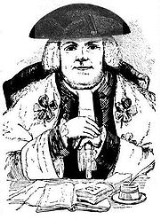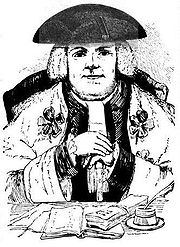
David Dalrymple, Lord Hailes
Encyclopedia

Scotland
Scotland is a country that is part of the United Kingdom. Occupying the northern third of the island of Great Britain, it shares a border with England to the south and is bounded by the North Sea to the east, the Atlantic Ocean to the north and west, and the North Channel and Irish Sea to the...
advocate
Advocate
An advocate is a term for a professional lawyer used in several different legal systems. These include Scotland, South Africa, India, Scandinavian jurisdictions, Israel, and the British Crown dependencies of Jersey, Guernsey and the Isle of Man...
, judge
Judge
A judge is a person who presides over court proceedings, either alone or as part of a panel of judges. The powers, functions, method of appointment, discipline, and training of judges vary widely across different jurisdictions. The judge is supposed to conduct the trial impartially and in an open...
and historian
Historian
A historian is a person who studies and writes about the past and is regarded as an authority on it. Historians are concerned with the continuous, methodical narrative and research of past events as relating to the human race; as well as the study of all history in time. If the individual is...
, born in Edinburgh
Edinburgh
Edinburgh is the capital city of Scotland, the second largest city in Scotland, and the eighth most populous in the United Kingdom. The City of Edinburgh Council governs one of Scotland's 32 local government council areas. The council area includes urban Edinburgh and a rural area...
.
Family
His father, Sir James Dalrymple, 2nd BaronetSir James Dalrymple, 2nd Baronet
Sir John Dalrymple, 2nd Baronet MP for Haddington BurghsPrincipal Auditor of the Exchequer in Scotland.Son of Sir David Dalrymple, 1st Baronet...
, of Hailes, Haddingtonshire, Auditor of the Exchequer in Scotland
Auditor of the Exchequer in Scotland
The Scottish Exchequer had a similar role of auditing and deciding on Royal revenues as in England. It was not until 1584 that it also became a court of law, separate from the King's Privy Council. Even then, the judicial and administrative roles never became completely separated into two bodies,...
, was a grandson of James Dalrymple, 1st Viscount of Stair
James Dalrymple, 1st Viscount of Stair
James Dalrymple, 1st Viscount of Stair , Scottish lawyer and statesman, was born at Drummurchie, Barr, South Ayrshire.-Biography:...
; and his mother, Lady Christian Hamilton, was a daughter of Thomas Hamilton, 6th Earl of Haddington
Thomas Hamilton, 6th Earl of Haddington
Thomas Hamilton, 6th Earl of Haddington KT was a Scottish politician.The son of Charles Hamilton, 5th Earl of Haddington and Margaret Leslie, 8th Countess of Rothes, he was christened on 5 September 1680...
. The eldest of sixteen children, he succeeded to his father's baronet
Baronet
A baronet or the rare female equivalent, a baronetess , is the holder of a hereditary baronetcy awarded by the British Crown...
cy upon his death in 1751.
Career
He was educated at EtonEton College
Eton College, often referred to simply as Eton, is a British independent school for boys aged 13 to 18. It was founded in 1440 by King Henry VI as "The King's College of Our Lady of Eton besides Wyndsor"....
, and studied law at Utrecht. In 1748 upon his return to Scotland from Utrecht he was admitted an Advocate
Advocate
An advocate is a term for a professional lawyer used in several different legal systems. These include Scotland, South Africa, India, Scandinavian jurisdictions, Israel, and the British Crown dependencies of Jersey, Guernsey and the Isle of Man...
. It is said that as a pleader he attained neither high distinction nor very extensive practice, but he rapidly established a well-deserved reputation for sound knowledge, unwearied application and strict probity, and in 1766 he was elevated to the bench in the Court of Session
Court of Session
The Court of Session is the supreme civil court of Scotland, and constitutes part of the College of Justice. It sits in Parliament House in Edinburgh and is both a court of first instance and a court of appeal....
where he assumed the title of Lord Hailes. Ten years later he was appointed a Lord of Justiciary.
Marriage
He was twice married: (1) in 1763, to Anne, daughter of Sir George Broun, Lord Coalston, a Lord of SessionCourt of Session
The Court of Session is the supreme civil court of Scotland, and constitutes part of the College of Justice. It sits in Parliament House in Edinburgh and is both a court of first instance and a court of appeal....
, by whom he had a daughter, Christian (d.1838). He remarried (2) March 20, 1770, Helen (d. 1799), daughter of Sir James Fergusson, Baronet
Fergusson Baronets
The Fergusson Baronetcy, of Kilkerran in the County of Ayr, is a title in the Baronetage of Nova Scotia. It was created on 30 November 1703 for the prominent advocate John Fergusson. The second Baronet represented Sutherland in the House of Commons and served as a Lord of Session under the judicial...
, of Kilkerran, Ayrshire, by whom he had another daughter, Jean (d.1803) who married her cousin, James Fergusson, Esq., and left issue.
Upon the death of Lord Hailes, his baronetcy passed to his nephew, James, 3rd Bt., the son of his brother John Dalrymple, Lord Provost of Edinburgh.
Lord Hailes as historian
Lord Hailes's most important contribution to literature was the Annals of Scotland, of which the first volume, From the accession of Malcolm III, surnamed Canmore, to the accession of Robert I, appeared in 1776, and the second, From the accession of Robert I, surnamed Bruce, to the accession of the house of Stewart, in 1779. It is, as his friend Dr JohnsonSamuel Johnson
Samuel Johnson , often referred to as Dr. Johnson, was an English author who made lasting contributions to English literature as a poet, essayist, moralist, literary critic, biographer, editor and lexicographer...
justly described this work at the time of its appearance, a "Dictionary" of carefully sifted facts, which tells all that is wanted and all that is known, but without any laboured splendour of language or affected subtlety of conjecture.
The other works of Lord Hailes include:
- Historical Memoirs concerning the Provincial Councils of the Scottish Clergy (1769)
- An Examination of some of the Arguments for the High Antiquity of Regiam MajestatemRegiam MajestatemThe Regiam Majestatem is the earliest surviving work giving a comprehensive digest of the Law of Scotland. The name of the document is derived from its first two words...
(1769) - Remains of Christian Antiquity, 3 vols.
- Account of the Martyrs of Smyrna and Lyons in the Second Century, 1776
- The Trials of Justin MartyrJustin MartyrJustin Martyr, also known as just Saint Justin , was an early Christian apologist. Most of his works are lost, but two apologies and a dialogue survive. He is considered a saint by the Roman Catholic Church and the Eastern Orthodox Church....
, CyprianCyprianCyprian was bishop of Carthage and an important Early Christian writer, many of whose Latin works are extant. He was born around the beginning of the 3rd century in North Africa, perhaps at Carthage, where he received a classical education...
, etc., 1778 - The History of the Martyrs of Palestine, translated from Eusebius, 1780)
- Disquisitions concerning the Antiquities of the Christian Church (1783)
- editions or translations of portions of LactantiusLactantiusLucius Caecilius Firmianus Lactantius was an early Christian author who became an advisor to the first Christian Roman emperor, Constantine I, guiding his religious policy as it developed, and tutor to his son.-Biography:...
, TertullianTertullianQuintus Septimius Florens Tertullianus, anglicised as Tertullian , was a prolific early Christian author from Carthage in the Roman province of Africa. He is the first Christian author to produce an extensive corpus of Latin Christian literature. He also was a notable early Christian apologist and...
and Minucius Felix.
In 1786 he published An Inquiry into the Secondary Causes which Mr Gibbon
Edward Gibbon
Edward Gibbon was an English historian and Member of Parliament...
has assigned for the Rapid Growth of Christianity (Dutch translation, Utrecht, 1793), one of the most respectable of the very many replies which were made to the famous 15th and 16th chapters of the Decline and Fall of the Roman Empire. A Memoir of Lord Hailes is prefixed to the 1808 reprint of his Inquiry into the Secondary Causes.
External links
- David Dalrymple, Lord Hailes at James Boswell - a Guide

